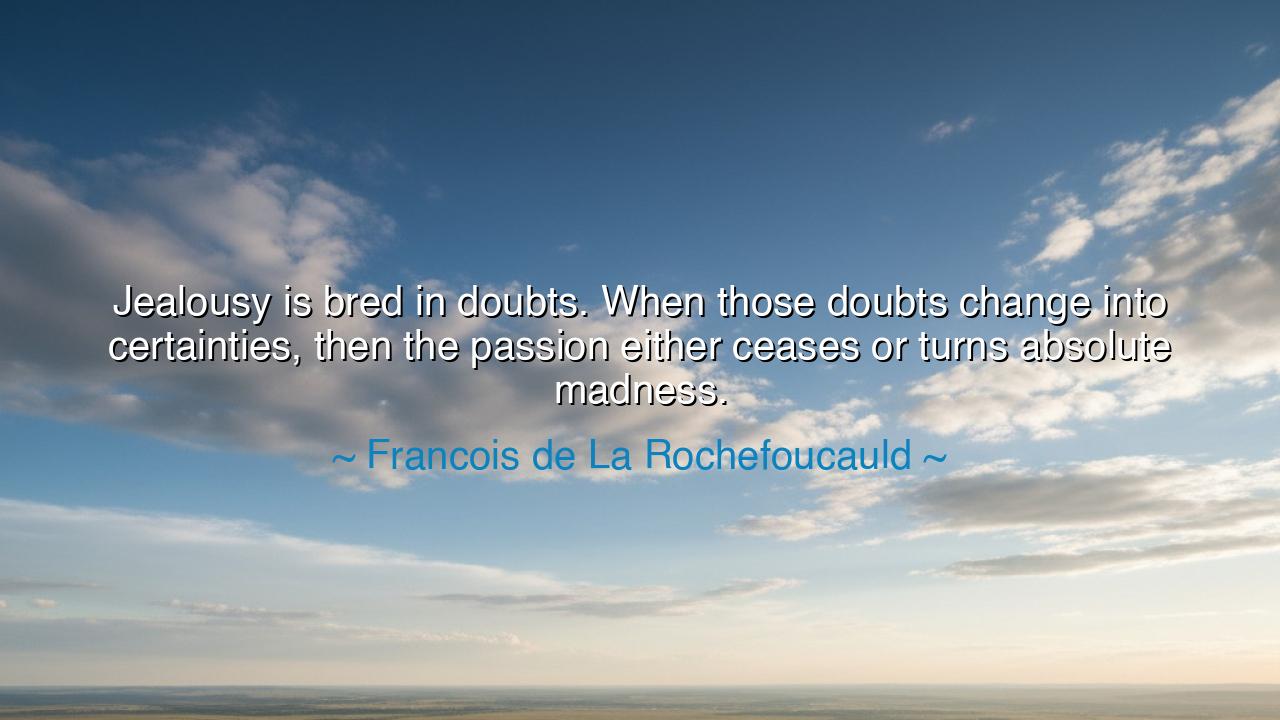
Jealousy is bred in doubts. When those doubts change into
Jealousy is bred in doubts. When those doubts change into certainties, then the passion either ceases or turns absolute madness.






In the piercing and elegant words of François de La Rochefoucauld, the French moralist and philosopher of the seventeenth century, there lies a truth as deep as it is unsettling: “Jealousy is bred in doubts. When those doubts change into certainties, then the passion either ceases or turns absolute madness.” With the precision of a surgeon and the insight of a sage, La Rochefoucauld dissects the human heart, revealing the fragile root from which jealousy springs — not hatred, not malice, but doubt. This is the poison that first enters the mind softly, like a whisper, and if left to grow, becomes a storm that consumes reason itself.
To understand the origin of this thought, we must first know the man who spoke it. François de La Rochefoucauld lived among the glittering courts of Louis XIV — an age of elegance and deceit, where every smile hid ambition and every friendship concealed rivalry. He was both a nobleman and a philosopher, a man who observed the masks of society with sharp clarity. From the intrigues of love and politics, he drew his Maxims — brief, blazing truths about human nature. In this quote, he captures one of his keenest observations: that jealousy, like a disease, begins not with proof, but with suspicion; and that once suspicion becomes certainty, it either dies or destroys.
La Rochefoucauld understood the delicate mechanism of the heart. Jealousy is a creature born of fear — fear of loss, fear of betrayal, fear that one’s love or worth may not be enough. As long as uncertainty reigns, the jealous mind feeds upon it, turning every silence into a sign, every glance into evidence. But when doubt becomes certainty — when the truth is known — jealousy stands at a crossroads. It can either cease, for there is no more mystery to sustain it, or it can explode into madness, for the wounded heart cannot bear the weight of what it has discovered. Thus, jealousy thrives only in the twilight between knowing and not knowing — in that painful half-light where imagination replaces truth.
History is filled with tales that echo this insight. Consider the tragedy of Othello, the Moor of Venice, in Shakespeare’s immortal play. His love for Desdemona was pure, but his faith was fragile. When the seed of doubt was planted by the villain Iago, it took root swiftly, feeding on whispers and half-truths. Othello’s heart, once noble, grew poisoned by jealousy. Yet even as he tortured himself with suspicion, it was not truth that consumed him — it was doubt. When at last he believed Desdemona’s betrayal to be certain, his jealousy became madness, driving him to murder the very soul he adored. La Rochefoucauld’s words live perfectly in Othello’s fall: doubt begat jealousy, and certainty birthed insanity.
There is, in this truth, a warning for every soul. Jealousy, though often mistaken for proof of love, is in truth the enemy of love. Where love trusts, jealousy suspects; where love frees, jealousy binds. It builds its house in uncertainty, thriving in the cracks of confidence. Yet when it believes its suspicions confirmed, it either vanishes — leaving emptiness behind — or turns violent, destroying what it once sought to protect. The wise must therefore guard their hearts from doubt, for doubt, once indulged, can consume even the purest affection.
And yet, La Rochefoucauld does not condemn passion entirely. His words also teach us of human vulnerability — that to love deeply is to risk fear, and to fear is to risk jealousy. The task of the wise, then, is not to banish emotion, but to govern it. Just as the ancients spoke of mastering desire through self-knowledge, so must we master jealousy through trust and reason. To question is human; to let questioning become torment is folly. When suspicion arises, one must confront it not with anger, but with clarity — for in the light of truth, jealousy cannot survive.
The lesson, therefore, is both delicate and profound: be wary of doubt, for it is the shadow that follows love. Trust not blindly, but also do not live enslaved to suspicion. When jealousy stirs within you, ask: is it truth that troubles me, or fear? Seek communication, seek understanding — for where truth is spoken, jealousy fades. And if the truth you find wounds you, meet it with dignity, not madness. For though betrayal may break the heart, jealousy destroys the soul.
So, my listener, remember the wisdom of François de La Rochefoucauld. Doubt may whisper; do not let it rule. Love may fear; do not let it falter. For jealousy, when unchecked, consumes all it touches — turning passion into obsession, and affection into ruin. But the heart that learns to trust, to reason, and to let go, walks the higher path — the path of freedom, where love, unchained from doubt, becomes not madness, but strength eternal.






AAdministratorAdministrator
Welcome, honored guests. Please leave a comment, we will respond soon